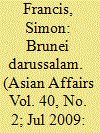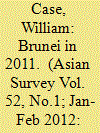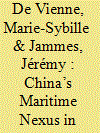| Srl | Item |
| 1 |
ID:
089350


|
|
|
|
|
| Publication |
2009.
|
| Summary/Abstract |
A critical assessment of the history of Brunei over the last fifty years, with particular emphasis on the evolution of the economy and the way in which the constitutional process has been managed. The author discusses a number of areas of possible concern for the future, including the position of non-citizens and the difficulties of diversifying an economy almost entirely based on oil and gas.
|
|
|
|
|
|
|
|
|
|
|
|
|
|
|
|
| 2 |
ID:
113926


|
|
|
|
|
| Publication |
2012.
|
| Summary/Abstract |
Brunei Darussalam remained untroubled throughout 2011. The government experimented with greater political openness and social reforms. It organized an election for at least part of its Legislative Council. It continued to make advances on women's and environmental issues. Meanwhile, the oil-based economy mostly remained steady. Foreign relations were benign.
|
|
|
|
|
|
|
|
|
|
|
|
|
|
|
|
| 3 |
ID:
174818


|
|
|
|
|
| Summary/Abstract |
At the 17th ASEAN Regional Forum in 2010, Chinese Minister of Foreign Affairs Yang Jiechi reminded everyone that “China is a big country and all the other countries are small countries; this is a fact.” Though Brunei is the smallest of all the ASEAN states in both population and GDP, the level of Chinese investment in the sultanate (cumulated direct investment and construction contracts divided by 2018 GDP) is much higher than in most other ASEAN states. This paper analyzes the Belt and Road stakes for both Brunei and China and Brunei’s response to the Chinese proposals, showing that in spite of its smallness, the sultanate still seems able to preserve its own interests to a certain extent, thanks to its balanced foreign policy and its financial resources.
|
|
|
|
|
|
|
|
|
|
|
|
|
|
|
|
| 4 |
ID:
144823


|
|
|
|
|
| Summary/Abstract |
This paper examines the conduct of fiscal policy in Brunei from 2003Q1 to 2014Q2, focusing on the cyclical patterns in government expenditure. The results from a structural vector autoregression model provide evidence that fiscal policy in Brunei is procyclical, which has an expansionary effect on output and thus exacerbates the business cycle. This behaviour is primarily driven by procyclical current expenditure while capital expenditure is largely acyclical. The government should exercise caution to avoid adding cyclical pressures to the economy already afflicted by volatile oil prices. A key policy recommendation would be to adopt clear fiscal rules and better integration of the reserve funds in the budgetary framework to delink government spending from volatile oil revenues.
|
|
|
|
|
|
|
|
|
|
|
|
|
|
|
|
| 5 |
ID:
154721


|
|
|
|
|
| Summary/Abstract |
The author conducted a case study of Anggerek Desa Technology Park in Brunei Darussalam, using an economic sociology approach, to understand the knowledge flow process among small and medium businesses in the ICT sector. Anggerek Desa is a technology park that was designed by the Government of Brunei Darussalam in a top-down manner. The field study and analysis employed a mode of thick description in which data was collected through a combination of in-depth semi-structured interviews with 51 companies and policymakers in the Brunei Economic Development Board (BEDB), E-Government National Centre (BEDB) and Authority for Info-Communications Technology Industry (AiTi), observation and archival analysis from 2013 to 2015. The author contends that knowledge flow among smaller ICT start-up companies in Anggerek Desa takes place via informal networking activity and channels of communication. The informal communication links between the ICT companies have persisted, even after the companies relocated outside Anggerek Desa. The government has taken initiatives to tap into the existing knowledge flow by setting up a business incubator named iCenter and by providing training to ICT workers in the CRAFT facility.
|
|
|
|
|
|
|
|
|
|
|
|
|
|
|
|
| 6 |
ID:
132576


|
|
|
|
|
| Publication |
2014.
|
| Summary/Abstract |
Electricity prices in Brunei are highly subsidized, placing a heavy fiscal burden on the government budget. Prior to 1 January 2012, the primary electricity tariff in the residential sector was based on a Declining Block Tariff structure, and non-poor households enjoyed a disproportionately large share of total electricity subsidies. The government has since implemented a new electricity tariff in the residential sector based on an Increasing Block Tariff. The main objective of this paper is to evaluate the welfare impact for households. It is estimated that about 80 per cent of households benefit from the new tariff, with poor households enjoying a larger percentage gain compared to the old tariff. However, total electricity subsidies remain roughly unchanged under the new tariff; in addition, non-poor households continue to enjoy a substantial proportion of the subsidies. There is still much to be done to tackle the high fiscal costs of subsidies and the problem of distribution distortion.
|
|
|
|
|
|
|
|
|
|
|
|
|
|
|
|
| 7 |
ID:
184217


|
|
|
|
|
| Summary/Abstract |
This paper reassesses the impact of the residential electricity tariff reform implemented in 2012 on the distributional equity and fiscal cost of electricity subsidies in Brunei. Using data from the latest Household Expenditure Survey (HES) conducted in 2015/16, the study estimates that the poorest 20 per cent of households receive 18 per cent of total electricity subsidies, which is considerably larger than the previously estimated share of 11 per cent based on the 2010/11 HES data. This, in part, reflects behavioural changes induced by the reform to an increasing block tariff (IBT), as wealthier households reduce their electricity usage due to higher per-unit costs at higher levels of consumption while poorer households increase their usage as the tariff cost is cheaper in the first consumption block. Concomitantly, the fiscal cost of electricity subsidies has declined by more than 20 per cent following the tariff change. Yet, simulations of alternative reform scenarios show that there are substantial welfare gains and cost savings from refining the IBT structure, using a volume-differentiated tariff, or providing targeted cash transfers. The overarching message is that improving the design of subsidy schemes or introducing targeted transfers can achieve distributional equity and fiscal objectives more efficiently than existing electricity subsidies.
|
|
|
|
|
|
|
|
|
|
|
|
|
|
|
|